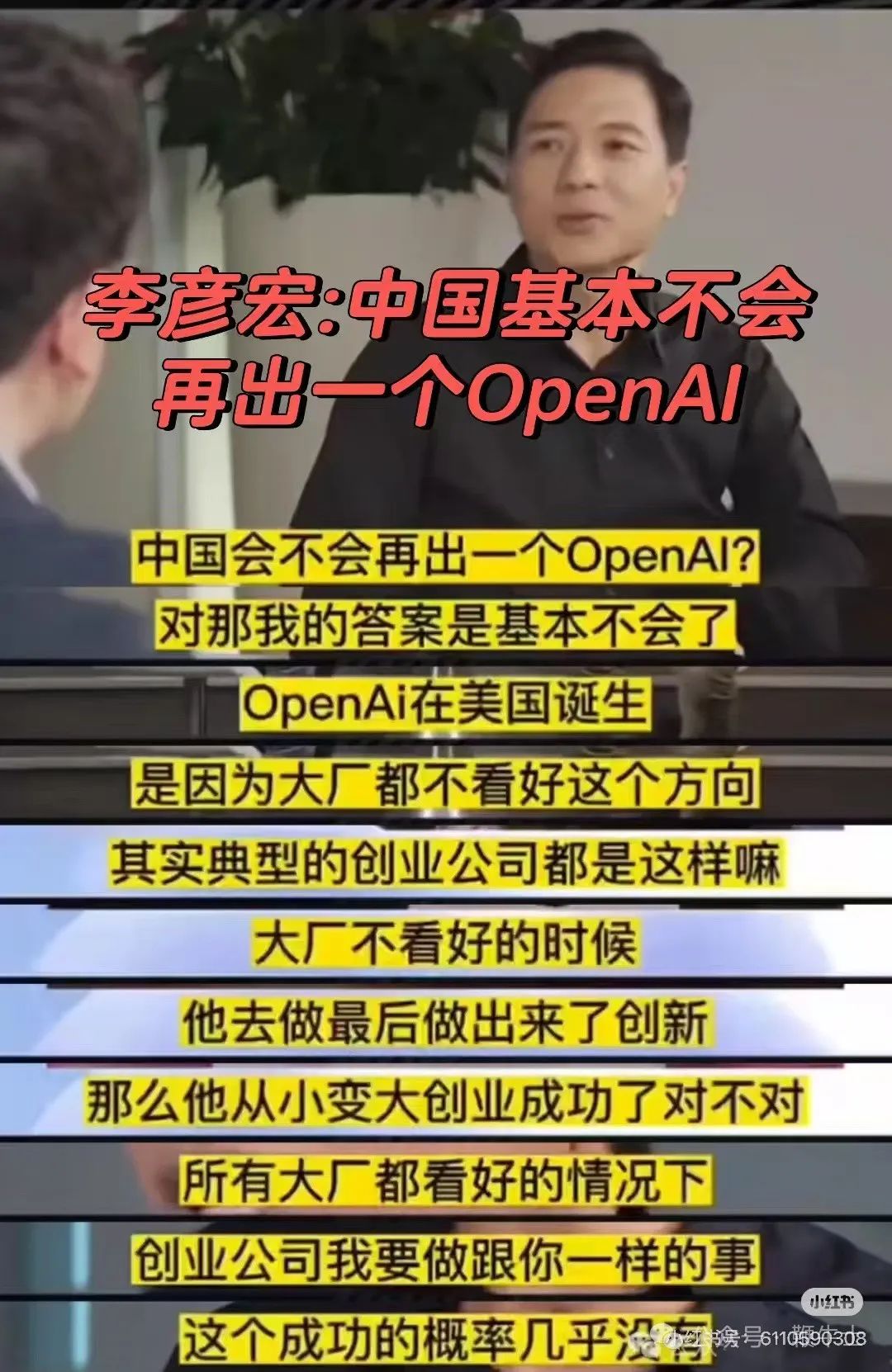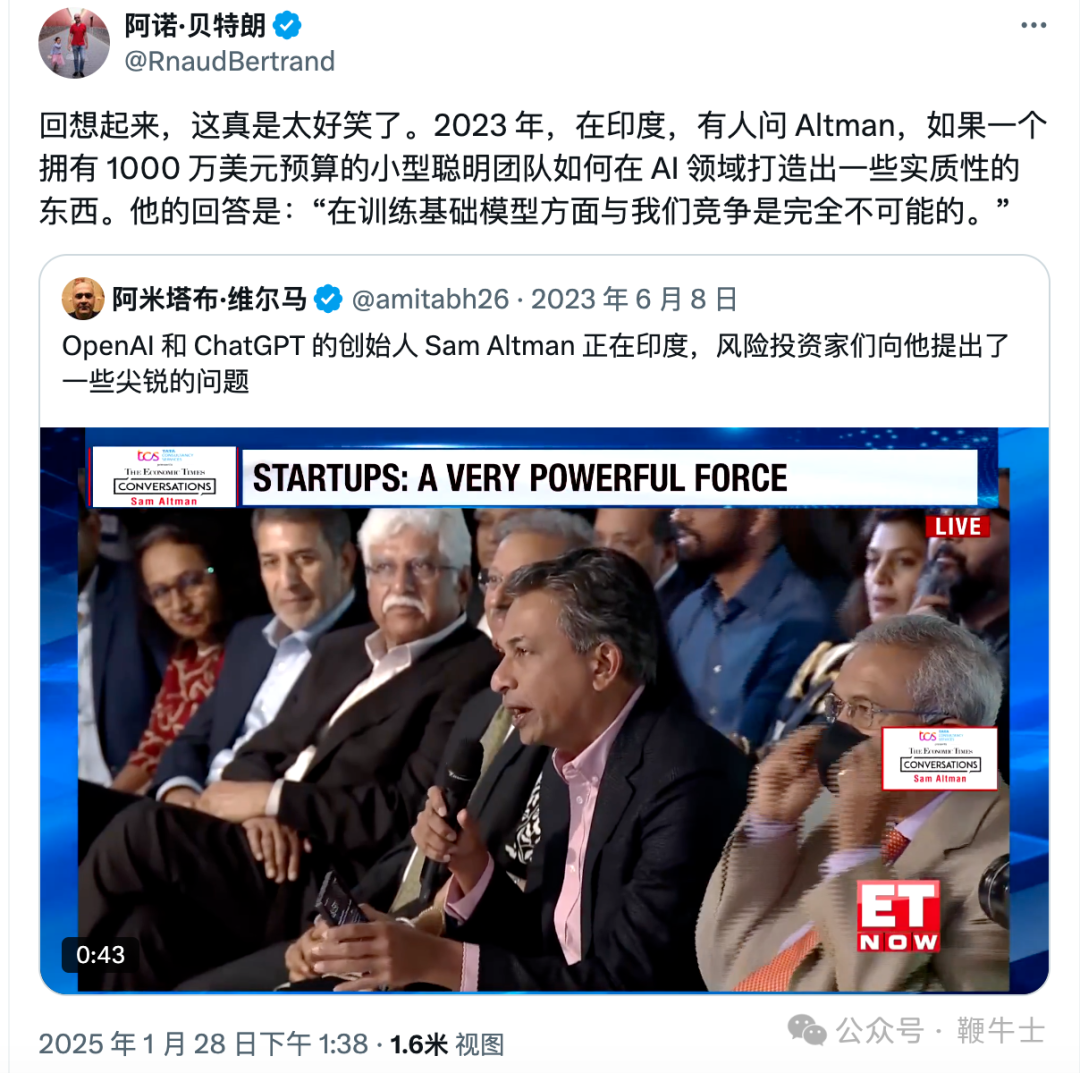DeepSeek Challenges Altman and Li Yanhong Alike
![]() 02/05 2025
02/05 2025
![]() 586
586
Bianiu News reported today:
January 29 News: The Chinese AI company DeepSeek has garnered significant attention in recent days.
The year-old startup DeepSeek showcased a remarkable feat last week: it unveiled an AI model named R1, akin to ChatGPT, boasting similar functionalities but at a fraction of the operational costs of popular AI models from OpenAI, Google, or Meta.
The company revealed that its base model's computing power cost a mere $5.6 million, a stark contrast to the hundreds of millions or billions of dollars spent by American companies on AI technology.
This revelation has sparked market doubts about a potential huge market bubble in AI computing power, leading to a steep decline in chip stocks. NVIDIA lost $600 billion on Monday but partially recovered on Tuesday.
British and American Media in Disarray
This astonishing result has thrown British and American media into chaos.
CNN reported that DeepSeek's meteoric rise is sending shockwaves through the AI field, threatening the U.S. dominance that seemed assured just a week ago.
CNN noted that many in Washington are well aware of the AI arms race the U.S. is engaged in. However, this race may be closer and more cost-effective than previously anticipated.
Meanwhile, the BBC predicted that DeepSeek signals a potential shift in the center of AI power away from the U.S.
The BBC stated that DeepSeek's topping of the Apple App Store charts has firmly placed it in the public eye, shaking the belief that the U.S. will remain the global AI superpower. Many already perceive the U.S. AI industry as overvalued, fueling discussions about an AI bubble. While this bubble has yet to burst, its structural integrity is undeniably under pressure. Some interpret DeepSeek's impact as a sign of an eastward shift in AI power, while others believe it may inspire innovators worldwide to develop their own low-cost AI technology. The multi-hundred-billion-dollar investment plans announced by the U.S. cannot be easily replicated elsewhere, but this may no longer be a concern.
NDTV even used hyperbolic language, claiming that the AI chatbot market has a new Chinese entrant competing with giants like OpenAI, Gemini, and ClaudeAI, disrupting U.S. hegemony in AI-based generative chatbot models. DeepSeek, a Chinese alternative to American-made AI models, has swept the entire industry.
The Wall Street Journal took a relatively optimistic stance, believing that DeepSeek will not overshadow American AI giants. This is primarily due to the many unknowns surrounding DeepSeek's claims, including the chips the company can use under the influence of sanctions.
DeepSeek Challenges Both Altman and Li Yanhong
DeepSeek has not only dealt a significant blow to NVIDIA in terms of chips and computing power but has also garnered praise and attention from figures like Trump and Altman. However, before Altman's comment, netizens noticed that DeepSeek might have first challenged Baidu CEO Li Yanhong. Baidu is one of the pioneers in developing large AI models in China and owns the Wenxiaoyan chatbot.
In a video interview with 36Kr in March 2023, Li Yanhong stated:

"Will there be another OpenAI in China? Basically not. OpenAI emerged because major American companies did not favor this direction, but now major Chinese companies are embracing large AI models. It doesn't make much sense for startups to recreate a ChatGPT. There are ample opportunities in developing applications based on large language models, and there's no need to reinvent the wheel. Cough, what do you call this?"
Two years later, a young quant named Liang Wenfeng challenged large model giants like OpenAI and Meta with DeepSeek's low-cost approach. Li Yanhong's warning was based on the assumption that startups cannot compete with large companies in resources and investment, thus making duplication unnecessary. However, DeepSeek has benefited from its low-cost strategy in building a large model, offering it at a cheaper price. Is it necessary to reinvent the wheel? Apparently, it is. With a cost of only $5.6 million, DeepSeek wiped out trillions of dollars in global tech stock market value overnight, causing tech billionaires to lose $100 billion in wealth, and sparking global doubts about high investments in chips and computing power.
Li Yanhong is not alone in this sentiment. Soon, American netizens discovered that OpenAI CEO Altman had also made similar remarks.
An old video of Altman went viral online, in which he stated that building an AI model with a budget of $10 million was hopeless.

During a speech at an event in India in 2023, Altman was asked: "How can a small, smart team with a budget of $10 million make a substantial impact in the AI field?" He replied, "It's completely hopeless to compete with us in training base models. In fact, DeepSeek's chatbot has recently become the highest-rated free app in the U.S. Apple App Store, while the valuation of American chipmaker NVIDIA has plummeted by nearly $600 billion in a single day - the largest single-day market cap evaporation in history."
Furthermore, Altman recently convinced Trump to invest $500 billion alongside SoftBank and other companies to build AI data in the U.S., known as StarGate. With your $5.6 million low-cost approach achieving what they aimed for with $500 billion, how can Altman face Trump now? However, Altman was gracious, praising the R1 model and stating, "DeepSeek's R1 is an impressive model, especially considering the excellent product they can provide at this price." Trump also noted that DeepSeek has sounded the alarm for American businesses.
Two years ago, with similar company statuses and leaders at the same level, Baidu and OpenAI were the leading players in large AI models in China and the U.S., respectively. In that context, the two tech CEOs expressed similar sentiments. We speculate that the costs were indeed prohibitive at the time, and most companies could not afford them. Additionally, the leaders likely wanted to deter more competitors from entering the large model space, which is understandable.
However, the media and netizens are always curious, and digging up old stories is one of the media's hallmarks. Just take it with a grain of salt. Besides, getting slapped in the face is a minor matter compared to the $600 billion loss NVIDIA has suffered, or Huang Renxun losing $20 billion in wealth overnight - getting slapped in the face is simply insignificant in this context.








